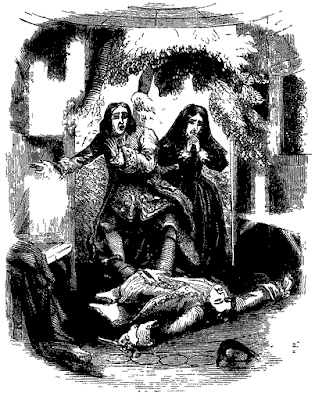I know it was far too long ago, but remember my complaint about Chapter 59? How JMR had set up something quite interesting in Chapter 58, and then knocked it down with a quick "sorry, just Jack being stupid again"?
In Chapter 61 (Chapter LXI. THE MYSTERIOUS STRANGER. -- THE PARTICULARS OF THE SUICIDE AT BANNERWORTH HALL.), it's clear that JMR is getting frightfully lazy about even that. The previous chapter ends with Varney disappearing. Chapter 61 begins with this:
"Hilloa where the deuce is he?" said the admiral. "Was there ever such a confounded take-in?"It's probably stupid for me to get pissed off about this. Varney clearly doesn't just disappear into midair at the end of Chapter 60; he causes a distraction and disappears when Chillingworth and the admiral aren't looking. That scene would certainly not get put on the list of evidence that Varney is actually a real vampire and not just trying to freak everyone out.
"Well, I really don't know," said Mr. Chillingworth; "but it seems to me that he must have gone out of that door that was behind him."
But it annoys me that JMR can't just leave it at that, where even if Varney does just escape through sleight-of-hand it's still a cool trick. He has to get all blasé about it. "Ho hum, I suppose he just ran out the door," with the sense of, "well, anyone could do that!"
I don't know; maybe Chillingworth's just jealous.
Moving on: a Mr. Mortimer comes to see Varney, presumably just so Henry (who conveniently rushes in moments later) can recap the plot to him. Chillingworth, Henry, and the admiral head back to Bannerworth Hall. "I perceive that, naturally, we are all three walking towards Bannerworth Hall," says Chillingworth in the middle of the walk, because that's a perfectly normal thing to say
Eventually they reach the garden and sit down in the summer-house.
Henry was silent for some few moments, and then he said, with a deep sigh, as he looked mournfully around him, --Okay, this made me laugh. Is it repeating dialogue for padding purposes? Is it purposely characterizing the admiral as lacking tact or social graces? Why can't it be both?
"It was on this spot that my father breathed his last..."
"Oh?" said the admiral; "he died here, did he?"
So they drone on a bit about Henry's father and exactly what he could see from this spot on the day that he died, as if the admiral and Chillingworth failed a spot check and now need Henry to describe all of the scenery to them in excruciating detail.
"You see," added Henry, "that from here the fullest view you have of any of the windows of the house is of that of Flora's room, as we have always called it, because for years she had had it as her chamber..."Sometimes the jokes just write themselves.
Henry tells the long and sad story about how his father was a noble man who meant well, but his friends corrupted him and got him addicted to gambling so that he fell into debt. He spends a great deal of time by the portrait of Varney, receives a letter that throws him into a fright, and commits suicide. His last words are, "The money is hidden!"
He finishes the story, and then suddenly, out of f---ing nowhere: Jack Pringle! I don't even know what he's doing here, and neither do the characters. The three end up deciding that Bannerworth Hall should not be left unattended, so Henry and the admiral stay while Chillingworth goes to town.
This was an ass of a chapter to get through, but ultimately it made me realize that the whole mystery of what Henry's father did with his money and how that has to do with Varney is what I really want to be reading about. Why do we need all these ridiculous filler chapters?
